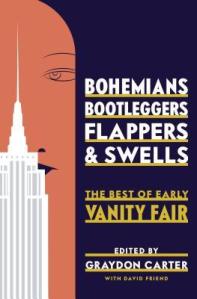BOOK REVIEW: Bohemians, Bootleggers, Flappers, and Swells by Graydon Carter, editor
 The title of this book promises more than it delivers. It’s a completion of seventy-two articles that were published in the magazine Vanity Fair in the 1910s, ‘20s, and ‘30s. On the whole, the articles are thoughtful, perceptive, and sometimes clever. I expected a frivolous, funny, and carefree expose of the Roaring-Twenties: jazz, bootleggers, flappers, swells, and bathtub gin. Those items are included but mostly veiled in a serious vein.
The title of this book promises more than it delivers. It’s a completion of seventy-two articles that were published in the magazine Vanity Fair in the 1910s, ‘20s, and ‘30s. On the whole, the articles are thoughtful, perceptive, and sometimes clever. I expected a frivolous, funny, and carefree expose of the Roaring-Twenties: jazz, bootleggers, flappers, swells, and bathtub gin. Those items are included but mostly veiled in a serious vein.
A few entries offer comic relief—those of Robert Benchley and P. G. Wodehouse, for examples. Conversely, the essays on the economics of the Great Depression in the 1930s are tedious. Blame the banks, not the greed of the proletariat who gamble on the stock market on twenty-percent margins.
There are whimsical Dorothy Parker poems, “Brevity is the soul of lingerie’, said this little chemise to itself.”
Edna S. Vincent Millay pens:
“After all’s said and after all’s done
What should I be but a harlot and a nun?”
The great literati of the Algonquin Round Table are admirably represented by Robert Benchley, Dorothy Parker, Robert E. Sherwood, Heywood Broun, and Alexander Woollcott,
Robert Sherwood’s 1920 article, “The Higher Education on the Screen” is on target in 2014.
Sophisticated humor is best represented by Geoffrey Kerr’s 1926 piece titled “A Western Reunion.” I’ll not divulge its secret style or content. It’s too much fun for me to spoil it.
Theodore Dreiser 1928 paean to Vladimir Lenin and Communism titled “Russia: The Great Experiment” is fraught with pro-Socialist agitprop. Here’s one egregious example, “Incidentally, the death sentence for all crimes with the exception of crimes against the State, military crimes and armed banditry was abolished…” Reckon he forgot about the twenty-million Russian his secret police (Cheka) murdered for “crimes against the State.” Here’s one more. (The political leaders are) “more earnest, more thoughtful, and since, more capable of thinking—and that is the highest compliment I can pay them.”
Thomas Mann’s 1929 article “The Extremely Moving Picture” espouses, “Films are not art, they are life and actuality.” And, “Art is significant, aristocratic, chaste, and sensitive… How different is the screen!”
Following are tidbits that I circled for their cogency.
- “A few fiddles, a saxophone, a banjo, a drum and endless instruments for the making of sheer noise.” (regarding jazz.)
- “(Those who smiled) were immediately arrested, lynched, and jailed, on the charge of habeas corpus with premeditated absence.” (E. E. Cummings in “When Calvin Coolidge Laughed.”)
- “…all that is fashionable is modern.” (Aldous Huxley says in “What, Exactly, is Modern?”)
- “The State should never be permitted to say what he shall eat and drink, what he shall think, what he shall say to his fellows.” (Sherwood Anderson in “Hello, Big Boy.”)
This book is sophisticated, erudite, and encompassing—an excellent read for the literary cognoscente.